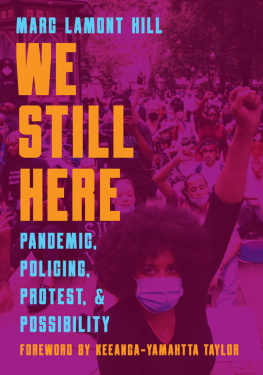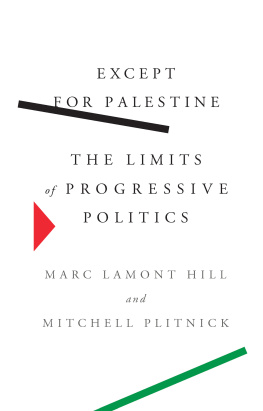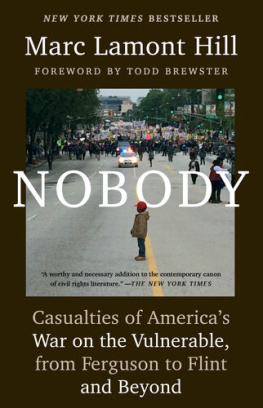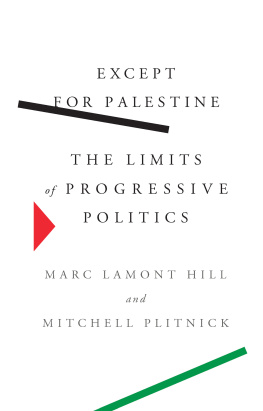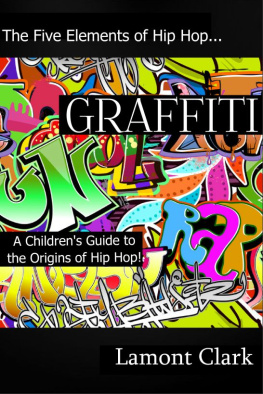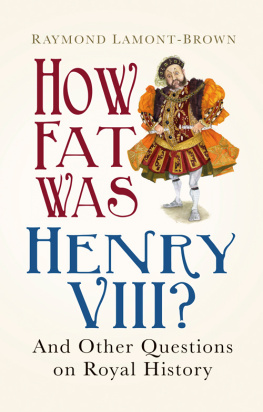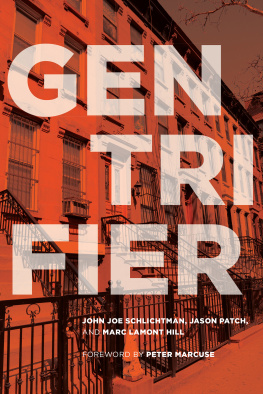Marc Lamont Hill - We Still Here
Here you can read online Marc Lamont Hill - We Still Here full text of the book (entire story) in english for free. Download pdf and epub, get meaning, cover and reviews about this ebook. publisher: Haymarket Books, genre: Politics. Description of the work, (preface) as well as reviews are available. Best literature library LitArk.com created for fans of good reading and offers a wide selection of genres:
Romance novel
Science fiction
Adventure
Detective
Science
History
Home and family
Prose
Art
Politics
Computer
Non-fiction
Religion
Business
Children
Humor
Choose a favorite category and find really read worthwhile books. Enjoy immersion in the world of imagination, feel the emotions of the characters or learn something new for yourself, make an fascinating discovery.
- Book:We Still Here
- Author:
- Publisher:Haymarket Books
- Genre:
- Rating:4 / 5
- Favourites:Add to favourites
- Your mark:
- 80
- 1
- 2
- 3
- 4
- 5
We Still Here: summary, description and annotation
We offer to read an annotation, description, summary or preface (depends on what the author of the book "We Still Here" wrote himself). If you haven't found the necessary information about the book — write in the comments, we will try to find it.
We Still Here — read online for free the complete book (whole text) full work
Below is the text of the book, divided by pages. System saving the place of the last page read, allows you to conveniently read the book "We Still Here" online for free, without having to search again every time where you left off. Put a bookmark, and you can go to the page where you finished reading at any time.
Font size:
Interval:
Bookmark:
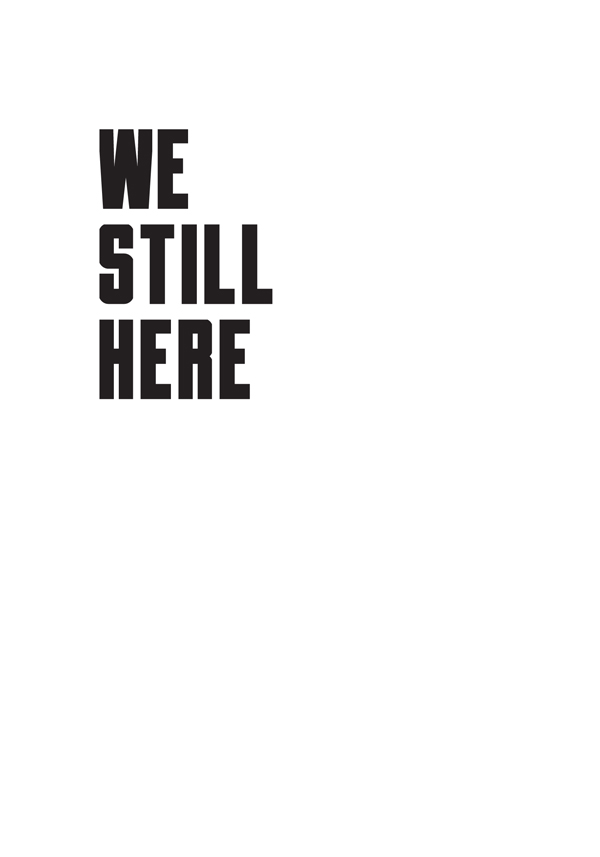
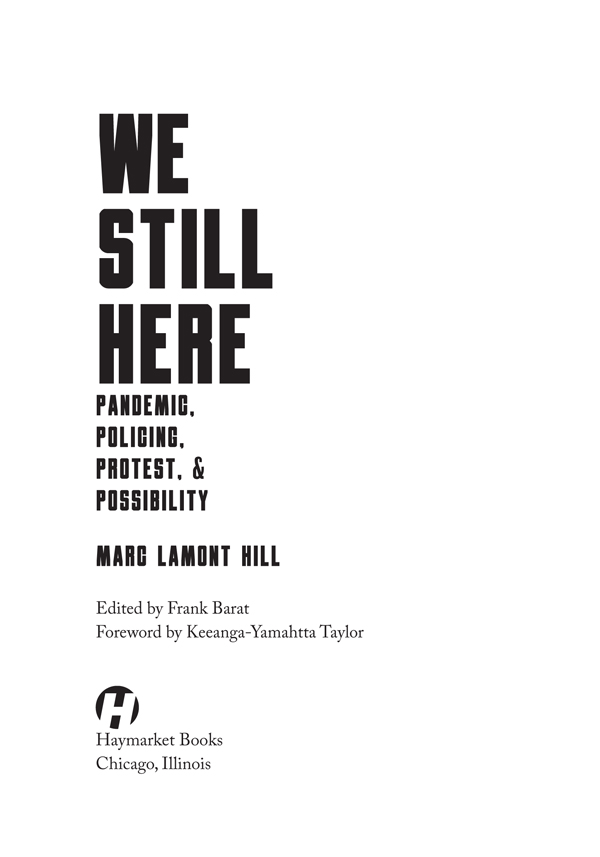
2020 Marc Lamont Hill
Published in 2020 by
Haymarket Books
P.O. Box 180165
Chicago, IL 60618
773-583-7884
www.haymarketbooks.org
ISBN: 978-1-64259-474-4
Distributed to the trade in the US through Consortium Book Sales and Distribution (www.cbsd.com) and internationally through Ingram Publisher Services International (www.ingramcontent.com).
This book was published with the generous support of Lannan Foundation and Wallace Action Fund.
Special discounts are available for bulk purchases by organizations and institutions. Please call 773-583-7884 or email for more information.
Cover photograph information on page 119.
Cover design by Rachel Cohen.
Library of Congress Cataloging-in-Publication data is available.

To my father, Leon M. Hill Jr., who continues to teach me daily lessons about courage, resilience, humility, and unconditional love.
and
To my daughter, Anya Coleman-Hill, whose brilliance, passion, and warrior spirit inspire me to keep writing and fighting for the world she deserves.
In the five decades since the last spasms of the Black insurgency, there have been periodic reminders that taking racism out of the law (to the limited extent that has even happened) has not been enough to remove it from our society. Usually these incidents come in the form of the pent-up rage unleashed by a riot or a catastrophic event that shows how history hangs onto the present, sometimes like a nightmare from which we cannot awaken. In our recent past, Hurricane Katrina shocked the nation out of a colorblind stupor to remind us all that to be poor and Black in the United States is to be at the rock bottom of a rigged social order. There was the mass murder of nine Black parishioners at Emanuel African Methodist Episcopal Church in South Carolina, just weeks after the Baltimore Rebellion raged in memory of murdered Freddie Gray. This was months into the emergence of the Black Lives Matter movement; a bitter rejoinder to the delusion of a post-racial society. This was the rhythm of a post-civil rights United States: periods of quiet and invisible suffering, punctuated with violent, syncopated outbursts in demands of belonging, justice, home.
But in the long end to legal racism, there has never been anything like the wretched, lost spring of 2020. The ravages of the novel coronavirus and its disease, Covid-19, and the deadly hum of racist violence inflicted on the bodies of Breonna Taylor and Ahmaud Arbery made it feel as if winter would never end. The mystery of this novel virus soon gave way to a dismal familiarity: premature death conjured by the preexisting conditions of racism, inequality, and their bitter harvests. Within a matter of weeks of the viruss arrival, it was coming into sharper focus that Black and Brown were going to bear the brunt of this disease. The ease of its transmissionand the impossibility of its prevention for the poor and working classwas bound to be a disaster in slow motion. What did social distance mean for people who could not work from home and whose jobs were instantly, and in Orwellian hyperbole, declared essential? Jobs just essential enough to keep Black women on the front lines, but not essential enough for hazard pay, personal protective equipment, or living wages that could pull these women away from the front lines of a generational public health crisis.
This slow-motion horror sped up while the grim body count began. Black people were dying at rates faster than anyone else in the country. In city after city, Black rates of infection and death were substantially higher than their proportion of the population. By the end of April 2020, it was clear that this new virus would have an outsized impact in Black communities because of the ways in which racism exposed ordinary Black people to the virus and broke all of the systems that might alleviate its impact. Black people were more likely to live in crowded housing, to not be properly insured, to suffer preexisting health ailments that could make the virus deadly. Of all the reminders that the United States remained a deeply racist and unequal society, long after the laws that nominally abolished racism had been written, Covid-19 was devastating.
As thousands of Black people were dying because racism rendered their lives expendable, the violence of the police showed again that their lives were also disposable. The public execution of George Floyd on a Minneapolis street in broad daylight showed that even in the midst of unprecedented national disaster, the police could be unmoved and continue their assaults on Black people.
But if the killings of George Floyd and Breonna Taylor lit the fuse, Covid-19 was the incendiary device waiting to explode. Across the country, tens of millions of people participated in the June uprisings that were a direct response against police racism and violence were also unmistakably against the social, economic, and political system that turned Covid-19 into the third leading cause of death for Black people in 2020.
The rebellion, as uprisings often do, introduced the viewpoint of the rowdy masses into the staid and stale governmental debates about insufficient levels of public aid. The rebellions have fundamentally changed the nature of the conversation by reviving the frameworks of systemic and institutional racism, as activists called for the defunding of the police and investment in genuine public services and programs. They have created a model for social transformation in the United States in ways profound and necessary.
Marc Lamont Hill offers critical insights into the whirlwind that pandemic and racism have reaped. We Still Here appears at a time of intense study and debate about how we got hereand, most important, how we get out. Politics, history, strategy, and tactics are all that our side has. Read this book, and well see you in the streets.
Keeanga-Yamahtta Taylor
August 25, 2020
Right after George Floyd was killed, on May 25, 2020, organizers in Philadelphia pulled together a huge protest. We were more than two months into the Covid-19 pandemic, and most of the people I knew had been home and socially distanced. But now my phone was blowing up. It was time to get out and make our voices heard. In all my adult life, there had hardly been a major action in my city I hadnt participated in. As I considered the situation, I had to confront this reality: we live in a country built on individualism and selfishnessand in this hour, our ability to survive, my ability to survive, was going to hinge on the actions of countless random others. I didnt worry about the activists I knew. But they werent going to be the only ones out there, and too many Americans had shown little regard for what was needed from every single one of us: to make our own selves uncomfortable in order to ensure anothers life. Thats what wearing masks is all about. You protect me; I protect you. It was a high-stakes call to become Martin Luther Kings beloved communityand immediately.
I had to make a calculation. I was a forty-one-year-old Black man living through a pandemic that was disproportionately killing Black people, regardless of age. I honestly wasnt sure that I could go and come back healthy. If I went to a protest and was exposed to the virus, would I survive? Would I wake up alone on a hospital ventilator, fighting for my life?
Next pageFont size:
Interval:
Bookmark:
Similar books «We Still Here»
Look at similar books to We Still Here. We have selected literature similar in name and meaning in the hope of providing readers with more options to find new, interesting, not yet read works.
Discussion, reviews of the book We Still Here and just readers' own opinions. Leave your comments, write what you think about the work, its meaning or the main characters. Specify what exactly you liked and what you didn't like, and why you think so.

